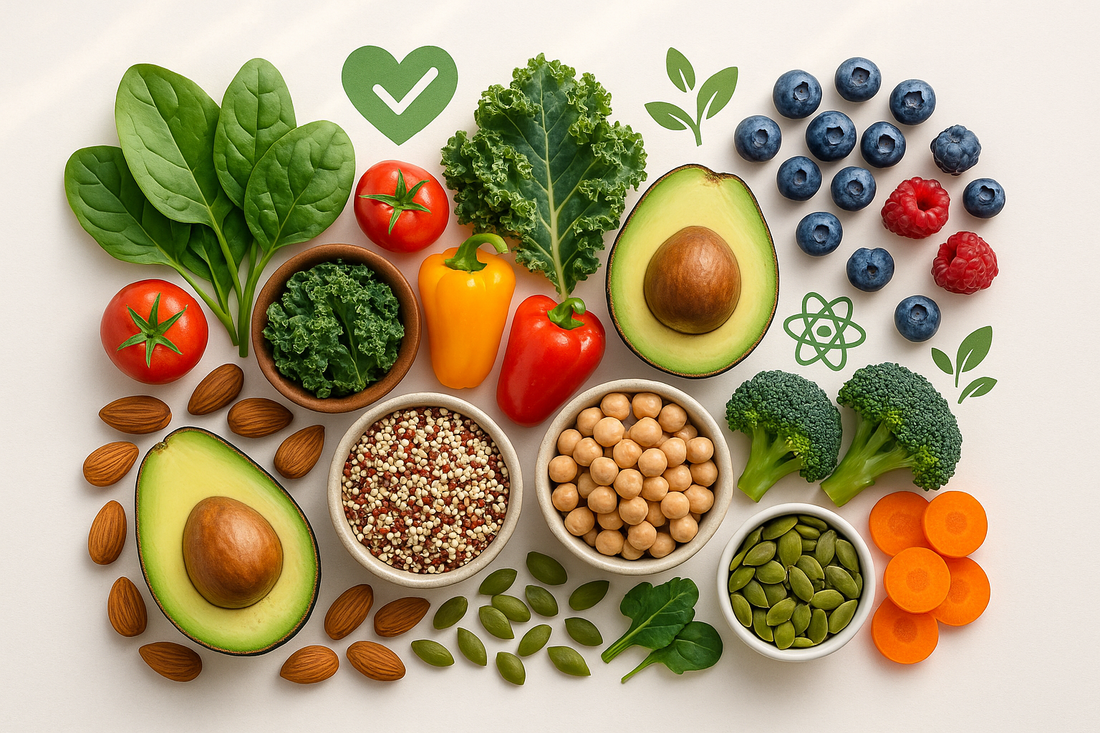
Optimizing Nutrition: The Key to Plant-Based Success
Share
Optimizing nutrition is crucial for anyone adopting a plant-based lifestyle. A well-planned plant-based diet can be incredibly nutritious and support long-term health. However, without careful consideration, some nutrients may be overlooked, which can affect overall health and energy levels.
Here’s a breakdown of key areas to focus on for plant-based success:
1. Protein
While plant-based diets can provide sufficient protein, it's important to consume a variety of sources to get a complete amino acid profile.
- Good sources: Lentils, chickpeas, beans, tofu, tempeh, quinoa, edamame, hemp seeds, chia seeds, and seitan.
- Tip: Include a variety of these protein-rich foods to ensure you're getting all essential amino acids.
2. Iron
Iron in plant-based foods (non-heme iron) isn’t absorbed as efficiently as the iron from animal products. But with the right strategies, plant-based eaters can still meet their needs.
- Good sources: Lentils, chickpeas, tofu, quinoa, fortified cereals, spinach, pumpkin seeds, and beans.
- Tip: Pair iron-rich foods with vitamin C (like citrus fruits, bell peppers, or broccoli) to improve absorption.
3. Vitamin B12
Vitamin B12 is naturally found only in animal products, so it's important for plant-based eaters to find alternative sources.
- Good sources: Fortified plant-based milks, nutritional yeast, fortified cereals, and B12 supplements.
- Tip: Since B12 is crucial for nerve function and red blood cell production, consider supplementing if you’re not consuming fortified foods.
4. Omega-3 Fatty Acids
Omega-3s are essential for heart and brain health, and while plant-based diets lack the direct sources of omega-3s (like fish), there are plant-based alternatives.
- Good sources: Chia seeds, flaxseeds, walnuts, and algae-based supplements.
- Tip: Ground flaxseeds or chia seeds are excellent additions to smoothies, oats, or baked goods.
5. Calcium
Calcium is vital for bone health, and while dairy is a common source, there are many plant-based alternatives.
- Good sources: Fortified plant milks, leafy greens (collard greens, kale, bok choy), tofu, almonds, and tahini.
- Tip: Eating a variety of calcium-rich foods and ensuring they’re fortified will help you meet daily needs.
6. Vitamin D
Vitamin D is essential for calcium absorption and overall immune function. While sunlight is the best source, it can be harder to get adequate Vitamin D during certain months or in specific climates.
- Good sources: Fortified plant-based milks, fortified cereals, and mushrooms exposed to sunlight.
- Tip: Consider a Vitamin D supplement if you live in an area with limited sunlight or don’t consume fortified foods regularly.
7. Zinc
Zinc supports immune function, wound healing, and cellular growth. It’s found in many plant-based foods, but absorption can be inhibited by certain compounds in plants.
- Good sources: Legumes, seeds, nuts, whole grains, and fortified cereals.
- Tip: Soaking or sprouting grains and legumes can help improve zinc absorption.
8. Iodine
Iodine is important for thyroid health. While it’s commonly found in seafood, plant-based eaters need to seek alternative sources.
- Good sources: Seaweed (nori, dulse, kelp), iodized salt, and certain fortified foods.
- Tip: Be mindful of your iodine intake, as both deficiency and excessive intake can be problematic for thyroid function.
Practical Tips for Success:
- Meal Planning: Planning your meals can ensure you’re meeting all your nutritional needs. Make sure you’re including a variety of foods from different groups.
- Supplement Wisely: Some nutrients, like B12 and possibly vitamin D, may need to be supplemented in a plant-based diet.
- Balance: Aim for a mix of macronutrients (protein, fats, and carbohydrates) and micronutrients (vitamins and minerals) to maintain energy, immune function, and overall health.
By being mindful of these nutrients and incorporating diverse, nutrient-dense foods, plant-based eaters can optimize their nutrition for success and thrive on their plant-based journey.
Are there any specific nutrients or tips you’d like to dive deeper into? Or maybe some meal ideas to make things easier?
